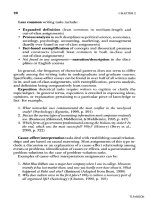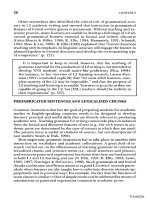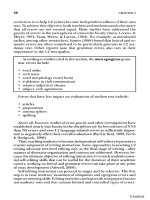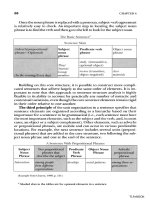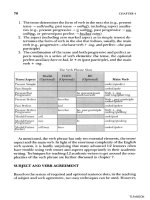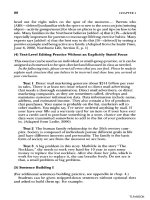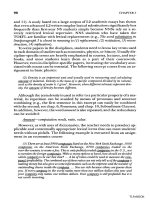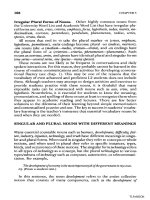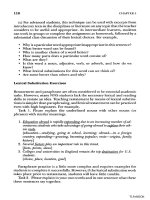Tài liệu Teaching academic ESL writing part 1 doc
Bạn đang xem bản rút gọn của tài liệu. Xem và tải ngay bản đầy đủ của tài liệu tại đây (394.55 KB, 10 trang )
TLFeBOOK
TEACHING ACADEMIC
ESL
WRITING
Practical
Techniques
in
Vocabulary
and
Grammar
TLFeBOOK
ESL
&
Applied Linguistics
Professor
Series
Eli
Hinkel, Series Editor
Birch
•
English
L2
Reading: Getting
to the
Bottom
Fotos/Browne
• New
Perspectives
on
CALL
for
Second Language Classrooms
Hinkel
•
Second Language Writers'
Text:
Linguistic
and
Rhetorical Features
Hinkel
•
Teaching
Academic
ESL
Writing: Practical Techniques
in
Vocabulary
and
Grammar
Hinkel/Fotos, Eds.
• New
Perspectives
on
Grammar
Teaching
in
Second
Language Classrooms
TLFeBOOK
Teaching
Academic
ESL
Writing
Practical
Techniques
in
Vocabulary
and
Grammar
Eli
Hinkel
Seattle
University
LAWRENCE
ERLBAUM ASSOCIATES, PUBLISHERS
2004 Mahwah,
New
Jersey London
TLFeBOOK
Copyright
©
2004
by
Lawrence Erlbaum Associates, Inc.
All
rights
reserved.
No
part
of
this book
may be
reproduced
in any
form,
by
photostat, microform, retrieval system,
or any
other means, without prior
written
permission
of the
publisher.
Lawrence Erlbaum Associates, Inc., Publishers
10
Industrial Avenue
Mahwah,
NJ
07430
Cover design
by
Kathryn Houghtaling Lacey
Library
of
Congress
Cataloging-in-Publication
Data
Hinkel,
Eli.
Teaching Academic
ESL
writing
:
practical techniques
in
vocabulary
and
grammar
/ Eli
Hinkel.
p. cm.
Includes bibliographical references
and
index.
ISBN
0-8058-3889-9
(cloth
:
alk. paper)
ISBN
0-8058-3890-2
(pbk.
:
alk. paper)
1.
English language—Rehtoric—Study
and
teaching.
2.
English language—
Study
and
teaching—Foreign speakers
3.
Academic writing—Studying
and
teaching.
I.
Title.
PE1404.H57
2003
808'042'071—dc21
2003046234
CIP
Books published
by
Lawrence Erlbaum Associates
are
printed
on
acid-
free
paper,
and
their bindings
are
chosen
for
strength
and
durability.
Printed
in the
United States
of
America
10
987654321
TLFeBOOK
To
RH
with love
and
gratitude
TLFeBOOK
This page intentionally left blank
TLFeBOOK
Contents
Preface
ix
Part
I
Academic Text
and
Teaching
Second
Language Writing
1 The
Importance
of
Text
in
Written Academic
3
Discourse:
Ongoing Goals
in
Teaching
ESL
Skills
2
Student Writing Tasks
and
Written Academic Genres
17
3
Curriculum
for
Teaching
the
Language Features
33
of
Academic Writing
Part
II
Sentences
and
Their Parts: Lexis
and
Grammar
4
Sentences, Phrases,
and
Text Construction
65
5
Nouns
and the
Noun Phrase
95
6
More
on the
Noun Phrase: Pronouns
125
7
Teaching
Verb
Tenses
and
Voice
in
Text Cohesion
143
8
Lexical Classes
of
Verbs:
Meanings
and
Text Functions
177
9
Adjectives
and
Adverbs
in
Academic Discourse
209
vii
TLFeBOOK
viii
CONTENTS
Part
III
Text
and
Discourse Flow:
The
Sentence
and
Beyond
10
Backgrounding Discourse
and
Information:
241
Subordinate Clauses
11
Rhetorical Features
of
Text: Cohesion
and
Coherence
279
12
Hedging
in
Academic Text
in
English
313
References
337
Author
Index
353
Subject
Index
357
TLFeBOOK
Preface
Language
is
power.
—Angela
Carter
Power
to the
people.
—A
slogan
from
the
1960s
Since
the
late 1970s
and
early 1980s,
a
great deal
of
time, energy,
and re-
sources
have been devoted
to
teaching non-native
L2
writers
the
rhetorical
features
of
written
academic discourse
in
English.
In
addition,
to
meet mar-
ket
demands
and the
expectations
of
professional
training
and
preparation
for
English
as a
Second Language
and
English
for
Academic Purposes
teachers, teacher-training
and
graduate programs have
set out to
address
teachers' on-the-job
skills
that pertain
to
teaching
L2
academic writers
how
to
generate
and
organize ideas into coherent
essays
and
compositions,
as is
expected
of
practically
all
students
at
undergraduate
and
graduate levels.
There
is
little doubt that
L2
writers
need
to be
familiar
with
many rhetor-
ical
and
discourse features
of
written English
and
that
the
teaching
of
col-
lege-
or
university-level writing cannot
do
without them.
In
teaching
L2
writing
to
academically bound learners, what
has
become
of
smaller impor-
tance, however,
is the
language tools (i.e.,
the
grammar
and
vocabulary that
L2
writers must have
to
construct academic text, which
in
turn
can be
orga-
nized into
a
coherent written academic discourse).
To put it
plainly,
no
mat-
ter how
well
discourse
is
organized
or how
brilliant
the
writer's ideas
may be,
it
would
be
hard
to
understand them
if the
language
is
opaque.
The
purpose
of
this book
is to
bridge
an
important
gap
that exists
in
teacher training today:
the
teaching
of the
second language
and its
gram-
matical
and
lexical features that
are
essential
for any L2
writing
teacher
and
student
writer
to
know.
The
teaching
of
rhetorical
and
discourse
properties
of
academic writing
in
English
can be
made
far
more
effective
and
efficient
if
L2
learners have language tools with which
to
build
the
text.
The
ultimate
ix
TLFeBOOK
